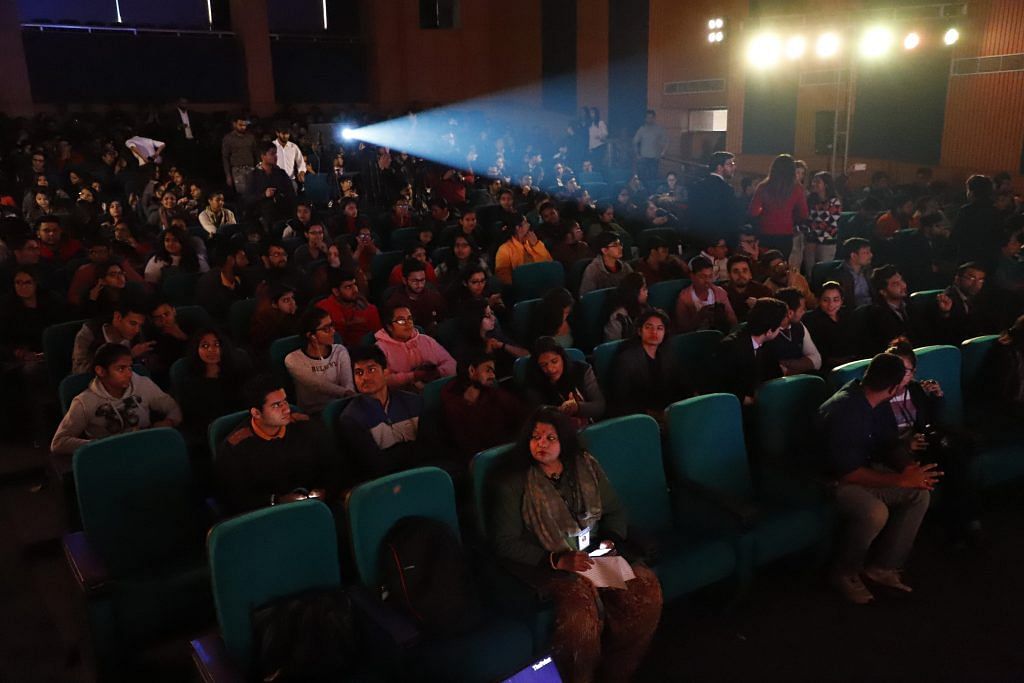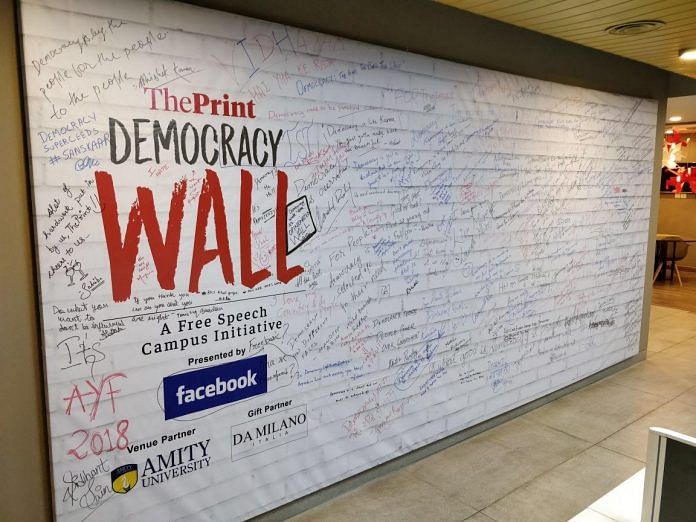At the first edition of ThePrint’s ‘Democracy Wall’, a free speech campus initiative, students of Amity University engaged with a stellar list of personalities from politics, cinema, business, comedy and military.
As a metaphor, Democracy Wall has its roots in post-Cultural Revolution China. By 1978, a serious appraisal of its excesses had started. In June-July 1978 big posters appeared on a wall in Beijing’s Xidan Street, raising these questions. Soon it became a movement as more people became emboldened to similarly come out with their views and similarly pasted them on walls in various cities. As the country broke out of a decade of the worst authoritarian excess, democratic expression flourished literally, on the walls.
Situations in India and China are far from comparable. Our choice of Democracy Wall as the name for our campus free speech initiative seeks to better understand and further enhance our constitutionally guaranteed freedoms. We also aim to involve students in the finest campuses across India in open dialogues on issues related to free speech and democratic rights with thought leaders and prominent, successful-and mostly young — people from diverse fields.

Amity University in Noida, on Delhi’s outskirts, was the venue for the inauguration of Democracy Wall. Taking the message of free speech there was a stellar cast of characters, from fields ranging from politics to cinema, soldiering to a most successful start-up and finally a trio of outrageously funny, but political comedians.
The five sessions of the day featured actor Richa Chadha in a conversation anchored by Contributing Editor Mahrukh Inayet, politician and MP Derek O’Brien barely kept in control by Associate Editor Ruhi Tewari, decorated Army veteran Col D.P.K. Pillay in conversation with Deputy Editor for defence and security Manu Pubby, Paytm founder Vijay Shekhar Sharma with Digital Director Diksha Madhok and comedy group Aisi Taisi Democracy, of course all by themselves.

There were enough highlights in the day to fill several pages. And not all of these came from our celebrity speakers. In fact, most came from Amity’s brightest students. Let me, list some of my favourites:
Probably the finest moment of the day came in Derek O’Brien’s session when he asked if there were any Bengali students in the hall. A young woman, Anmol, stood up but said: “I am a Bengali, but since I am the daughter of an Army officer, I’m really an Indian.” Derek was so touched he gifted her a signed copy of his latest book Inside Parliament: Views from the first row.
Super-talented actor Richa Chadha when she asked why are so many people in our popular debate war-mongering? They keep saying they love the Army, she said, but if you really love the Army, the last thing you should want is war. There were loud cheers from the entire hall.
Our Deputy Editor for defence Manu Pubby engaged Col D.P.K. Pillay, an Army veteran wounded and decorated in counter-insurgency, in a conversation and it never veered from the theme of freedom and free speech. Col. Pillay had the young audience cheering in adulation and awe when he said he had commanded a battalion of the Rajput Regiment and all his troops would have been deeply embarrassed by what is being done to the film Padmaavat in the name of Rajputs. The Army, he said, is there primarily to protect our freedoms.
There was a high point in the same session when a Kashmiri student was momentarily heckled for asking a tough question: people of Kashmir Valley do not love India. What can India do to make them love it? Col. Pillay responded with the greatest understanding and large-hearted honesty, “If you think Army or the Indian state is the problem, you are not reading historical narrative well. Our strengths would be to work within the confines of the Constitution, rather than against it.”
Founder of the super-successful start-up Paytm, Vijay Shekhar Sharma, brought home the strength of informality in entrepreneurial leadership which enables the youngest and the junior-most member of the team to speak her mind freely, and contribute without inhibition. He talked about his struggles in the big league early on with honesty rare for successful tycoons.
Comedy is the most audacious form of free speech. Particularly if it is political. The group performing at our first Democracy Wall, Aisi Taisi Democracy is anything if not that. Rahul Ram, Sanjay Rajoura and Varun Grover took turns at the microphone and had the hall rocking with laughter, and also marvelling at how nonchalantly they were able to make fun of everybody, however high.
The team of ThePrint editors was meanwhile carefully going over the entries received for the essay and photography contest on the theme, ‘Is politics a good choice for the youth?’ and freedom respectively. The prizewinners were Chandy Mathew and Tejas Parikh and you can read/see their works here. By the time the day ended, the canvas “Wall” at the venue was filled with notes, some profound, a few angry and some downright nutty. But nothing was censored or edited out. It was, after all, called Democracy Wall.
Democracy Wall is a free speech campus initiative of ThePrint.




This is an outright lie. Question is about the choice of the Prime Minister of India, and the discussion is about the selection of the Congress president of 1946. Everyone knows that the congress president is elected in the annual AICC session and not by PCCs. The opinion of the PCCs does not have any bearing. Secondly, people would think that Jawaharlal Nehru was made the Congress President in 1946. It is wrong! In fact it was J. B. Kripalani who was elected as the President.